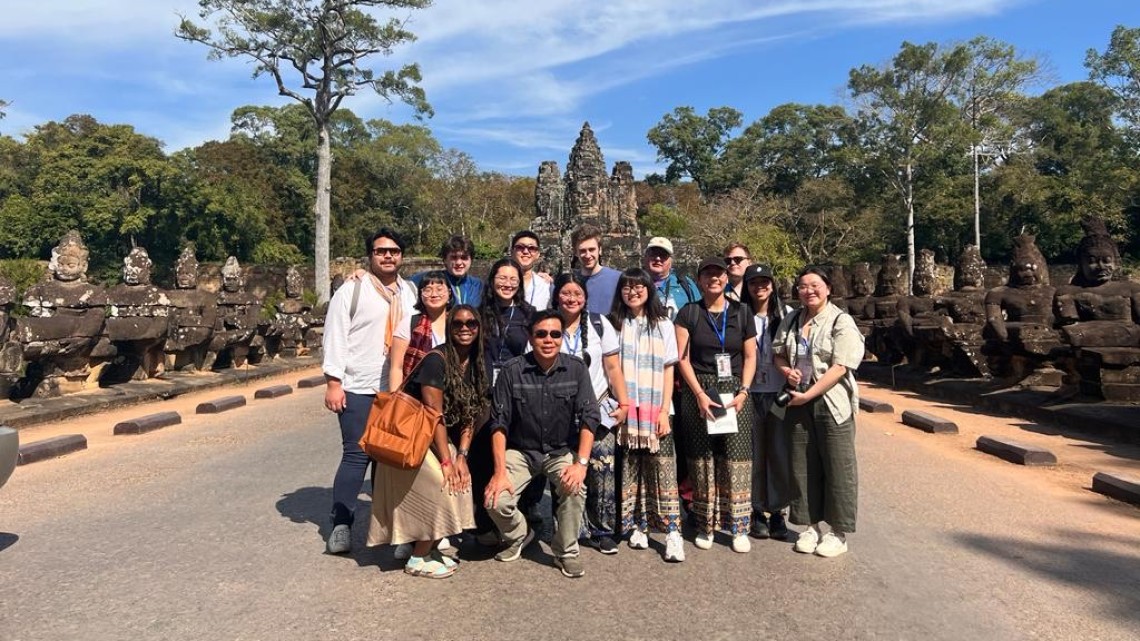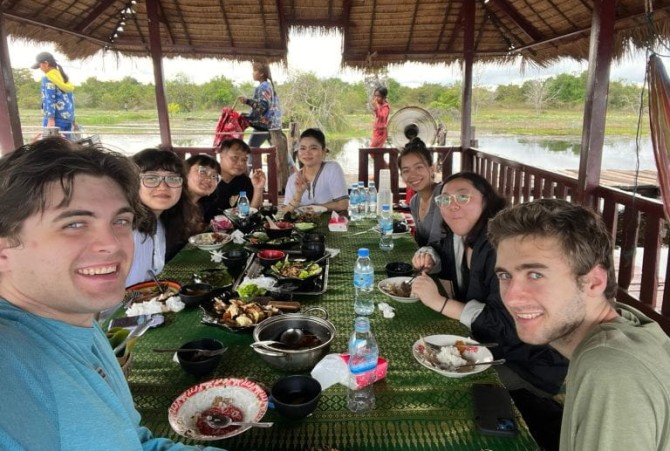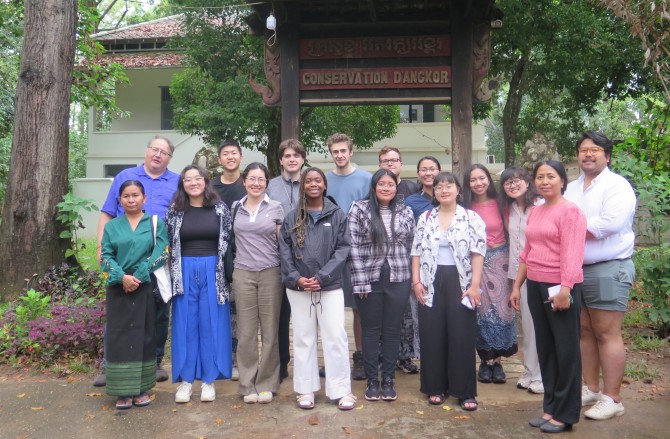
Cambodia winter program students with archaeology expert Ea Darith at the southern entrance to Angkor.
News directly from Cornell's colleges and centers
Study abroad students taste Cambodian culture
By Jennifer Lyons Sheri Englund
Benjamin Dever-Mendenhall ’24 spent winter session in Cambodia. On one busy day, he defended his backpack from long-tailed macaques while exploring the ruins of the 12th-century Bayon temple in Angkor – a site that preserves in stone the ancient empire’s transition from Hinduism to Buddhism.
Later, the College of Arts and Sciences (A&S) student visited SPOONS Cafe, an organization founded by a Cornell alumnus that trains low-income Cambodians to work in the hospitality industry. “We even had a chance to try some authentic Cambodian cuisine – beetles, silkworms and water bugs!” he said.
Cambodian heritage and history were the focus for Dever-Mendenhall and 11 other students who traveled to Southeast Asia in January as part of the Cornell Winter Program in Cambodia, a two-and-a-half-week intensive study abroad experience facilitated by the Office of Global Learning.
Sponsored by the Southeast Asia Program (SEAP), part of the Mario Einaudi Center for International Studies, in collaboration with the Center for Khmer Studies in Siem Reap, the three-credit course returned for the first time since 2020. It will continue on an annual schedule with the 2024 course focusing on contemporary labor and development.
Taught this year by Magnus Fiskesjö, associate professor of anthropology (A&S) and core faculty member in SEAP, the seven Cornell students and five students from peer institutions dove deep into the cultural heritage of Cambodia, both past and present.
“The main focus of these few weeks,” said Fiskesjö, “has been to gain an insight into Cambodia’s heritage and what it means today. Students visited the ruins of the ancient capital of Angkor and other sites, including some bombed by the U.S. when the Vietnam war expanded into Cambodia.”
The students’ experience began with a seven-week fall course to introduce basic Khmer (Cambodian) language and culture. The predeparture training provides vital contexts, but the in-person experience is transformative, says Fiskesjö.
“Seeing these sites for real and talking to Cambodians actively engaged in preserving and recapturing their heritage and culture,” he said during the trip, “is something one can really only experience by coming here.”
The Angkor Conservation Center, where the students learned about local efforts to repatriate and restore looted artifacts, was a moving point in the journey for computer science major Emily Vo ’25. “The group was asked not to take pictures in order to safeguard the center,” she said, noting that the conservators they met were “incredibly insightful.”
“Studying abroad in an intensive program like this – even for a short time – is a very important experience for our students,” Fiskesjö said. “We have seen museums and talked to professionals engaged in a struggle to recover treasures stolen from these ruins, such as statues held in U.S. museums.”
Undergraduate students across all colleges and majors will find study abroad programs worldwide to advance their academic and career goals, including opportunities offered through Cornell Global Hubs.
Applications are open now for a range of short-term, semester, and yearlong study abroad experiences. Study abroad applications for summer programs close on February 24. Applications for fall and full academic year programs close on March 1.
Interested students should explore study abroad programs, meet with an Office of Global Learning advisor and attend the spring Study Abroad Fair on Feb. 7 from 2:30 – 4:30 in Willard Straight Hall Memorial Room for a chance to learn more about programs and talk with recently returned students.
Jennifer Lyons is a freelance writer for Global Cornell and Sheri Englund is senior associate director for Global Cornell.
Media Contact
Get Cornell news delivered right to your inbox.
Subscribe


